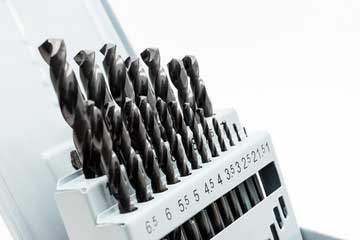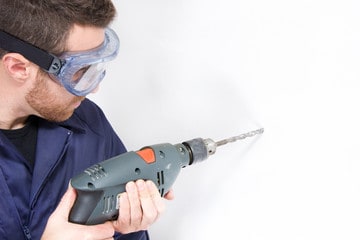Drill bits are made with different materials. In order to drill high-strength and hard material drilling processes, steel drill bits are used to drill wood. But drilling steel and more hard material will need more hard drill bits. As a solution of this high-speed steel (HSS), drill bits are made.
HSS drill bits are made by mixing these materials 0.85% C; 4% Cr; 5% Mo; 6% W; 2% V. According to its material mixing proportion, strength has varied. M1, M2, M7, M35, M42, and M50 have different strengths and resistance HSS. HSS is used for drill bits, cutting tools, knives, and many tough tools.
When you use the HSS drill bit, you should know its material properties, how to use it?, where to use and many more details, so you can grab all in details by using the article below. So keep reading on until you find your information.
What is HSS Drill Bit?
An HSS (High-Speed Steel) drill bit is a type of cutting tool used in drilling different materials. It is made from high-speed steel, a special kind of steel known for its exceptional hardness (Rockwell Hardness – 63-65) and resistance to wear and tear. HSS drill bits are extremely durable and capable of maintaining their sharpness for a prolonged period.
One of the defining attributes of HSS drill bits is their high cutting speed. This, combined with their heat resistance, allows them to withstand the high temperatures produced during drilling without losing their hardness or sharpness. In fact, they can maintain their hardness even at elevated temperatures, which makes them suitable for high-speed applications.
HSS drill bits are also known for their versatility. They can be used to drill a wide variety of materials, from soft metals to hard plastics, making them a popular choice in many industries. Moreover, they are available in a wide range of sizes and lengths, which further adds to their versatility.
Another important attribute of HSS drill bits is their precision. They are designed to produce accurate and clean holes, which is crucial in many applications. In addition, they are compatible with a variety of drills, making them a convenient option for many users.
Finally, HSS drill bits are resistant to oxidation or rusting. This ensures their longevity, even when exposed to moisture or corrosive substances. They can also withstand high drilling temperatures without losing their effectiveness or suffering damage. This makes them a reliable and cost-effective choice for a variety of drilling applications.
What are the HSS Drill Bit Materials?
HSS drill bits are made with 0.85% C; 4% Cr; 5% Mo; 6% W; 2% V (M2). The main material is steel. By changing these material proportions, its hardness can be varied. M1, M2, M7, M35, M50, M42 are the strength class of the HSS. Drill bits are made with mostly M2.
| Type | Carbon (%) | Tungsten (%) | Molybdenum (%) | Chromium (%) | Vanadium (%) | Cobalt (%) | Hardness Rockwell C (%) | Term |
| M1 | 0.80 | 1.50 | 8.00 | 4.00 | 1.00 | – | 63-65 | “HSS” |
| M2 | 0.85 | 6.00 | 5.00 | 4.00 | 1.90 | – | 63-65 | “HSS” |
| M7 | 1.00 | 1.75 | 8.75 | 4.00 | 2.00 | – | 63-65 | “HSS” |
| M35 | 0.80 | 6.00 | 5.00 | 4.00 | 2.00 | 5 | 65-67 | 5% Cobalt |
| M42 | 1.10 | 1.50 | 9.50 | 3.75 | 1.15 | 8 | 65-67 | Super Cobalt |
| M50 | 0.85 | 0.10 | 4.25 | 4.00 | 1.00 | – | 63-65 | “HSS” |

What are the Properties of High-Speed Steel?
Density (×1000 kg/m3) – 8.67
Poisson’s Ratio – 0.27-0.30
Elastic Modulus (GPa) – 190-210
Thermal Expansion (10-6/ºC) – 9.7
Thermal Conductivity (W/m-K) – 19.9
Rockwell Hardness – 63-65
What is the Cutting Speed of HSS Drill Bits?
HSS drill bits are used to drill mild steel, cast iron, softwood, plastic, hardwood, fiber, and many other soft materials. You can use a 118-degree angle for soft material drilling, such as aluminum, softwood, etc. And 135-degree for the hard material drilling, such as cast iron, using the HSS drill bits.
| Material | Recommended speed (SFM) |
| Aluminum and its Alloys | 200-300 |
| Brass and Bronze (Ordinary) | 150-300 |
| Bronze (High Tensile) | 70-150 |
| Die Casting (Zinc Base) | 300-400 |
| Iron-Cast (Soft) | 75-125 |
| Iron-Cast (Medium Hard) | 50-100 |
| Iron-Cast | 10-20 |
| Iron-Cast (Malleable) | 80-90 |
| Magnesium and its Alloys | 250-400 |
| Monel Metal or High-Nickel Steel, Stainless Steel | 30-50 |
| Plastics or Similar Materials | 100-300 |
| Steel (Mild 0.2 Carbon to 0.3 Carbon) | 80-110 |
| Steel (Mild 0.4 Carbon to 0.5 Carbon) | 70-80 |
| Steel (Tool 1.2 Carbon) | 50-60 |
| Forgings | 40-50 |
| Alloy – 300 to 400 Brinell | 20-30 |
You can calculate RPM using the SFM as below,
R.P.M. = (3.8197 / Drill Diameter) x S.F.M.
What are the Usages of HSS Bits?
HSS drill bits are used to drill soft materials such as aluminium, brass, mild steel, plastic, hardwood, softwood, fiber, etc. Coated HSS bits can be used to drill cast iron and many more tough materials.
In order to increase the performance, HSS bits are coated with Titanium Nitride (TiN), Titanium Carbon Nitride (TiCN), and Titanium Aluminium Nitride (TiAlN). Those will reduce the friction of the drill bit and material as well as increase the heat resistance and durability of the drill bit.
What Materials You Can’t Use HSS Drill Bits?
High-Speed Steel (HSS) drill bits are among the most popular types of drill bits due to their versatility, durability, and cost-effectiveness. However, they can’t be used for certain materials due to a few reasons:
- The hardness of the material could be too high, which results in the drill bit breaking, dulling quickly or overheating.
- The material might require a specialized bit for precision or to prevent damage.
- Some materials are difficult to penetrate or generate too much heat which degrades the HSS bits quickly.
- Finally, the lack of cooling and lubrication can ruin the bit when working on more challenging materials.
Here is a list of materials that you generally should not use HSS drill bits with unless you have no other choice:
- Heavy-duty steel and iron – These metals are very hard and require carbide or cobalt bits.
- Stainless steel – Its hardness and the large amount of heat it produces can overwhelm HSS drill bits.
- Hardened steel – This material is even tougher than regular steel and usually requires carbide bits.
- Hard cast Iron – Its brittle nature can break HSS drill bits.
- Thick copper – It tends to adhere to the drill bit and dull it quickly
- Tempered glass – This material requires special glass and tile drill bits due to its brittleness.
- Porcelain and ceramic tile – These materials are hard and brittle, so using HSS drill bits may cause cracks or chips.
- Fiberglass – Fiberglass can rapidly dull an HSS bit and create a messy hole.
- Certain types of plastic – Hard plastics can create high heat levels that can wear down or even melt HSS drill bits.
You can use cobalt drill bits as an option for the HSS drill bit.

